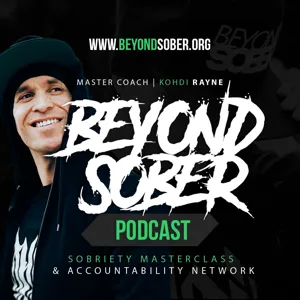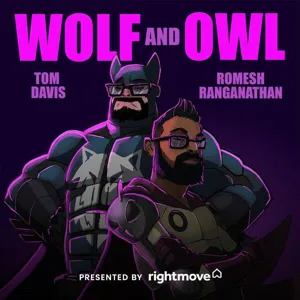Podcast Summary
Exploring the Healing Power of Music with Alison Russell: Music has the power to heal, inspire, and resonate deeply with us. Alison Russell's conversation on The Ezra Klein Show showcased her powerful music and discussions on race, history, and resilience.
Music has the power to heal, inspire, and resonate with us on a deeper level than other mediums. This was explored in the Ezra Klein Show through a conversation with musician Alison Russell. Russell, known for her intellectual project and powerful voice, discussed her lifelong connection to music and how it has helped her navigate trauma and explore deeper topics. The conversation included live performances of her songs, which served as jumping off points for deeper discussions. Russell's music, which explores race, history, and human resilience, is a testament to the healing and hopeful qualities of music. The conversation brought joy and inspiration to both the host and the audience, highlighting the importance of music in our lives.
Music as a source of connection and healing: Music has the power to connect us emotionally, foster shared experiences, and provide healing.
Music has a unique ability to connect us on a physiological, neurological, and emotional level, creating a sense of shared experience and heightened empathy that is rare in today's fragmented culture. This connection has been a constant throughout history, serving as a source of communal bonding and emotional healing. For the speaker, music was a lifeline during a difficult childhood, and her song "Persephone" is an ode to the love that saved her. The experience of performing music live, even for a small audience, is a deeply spiritual and joyful practice for her.
Music as a form of connection and healing: Music can evoke deep emotions, create empathy, and inspire personal growth through shared experiences and stories.
Music can serve as a powerful and meaningful form of connection and healing, providing a sense of spiritual and emotional resonance that can be just as impactful as religious rituals for some individuals. The speaker shares how playing music in a live setting and feeling the resonance in their body connects them with others and creates a sacred, empathy-growing energy. The lyrics of a particular song hold pain and trauma, but the hope and joy expressed in the music make it a source of survivor's joy and self-discovery for the speaker. They also discuss the importance of sharing their personal stories and experiences through music to help break cycles of trauma and inspire change.
Trauma and joy are deeply interconnected in childbirth: Acknowledge and normalize the coexistence of trauma and joy during significant life events, share stories to build community and normalize difficult topics.
Trauma and joy are deeply interconnected experiences, particularly in the context of significant life events like childbirth. Trauma, whether it's the physical pain of childbirth or the emotional trauma of other experiences, can coexist with profound joy and unconditional love. As the speaker shared, the birth of her child was a miraculous and joyful experience, but also one filled with pain and trauma. This is a common theme in human life, and it's important to acknowledge and normalize these complex emotions. Moreover, the speaker emphasized the importance of sharing our stories and experiences, particularly the difficult ones, as a way to build community and normalize the daily traumas and joys that we all encounter. She noted that there is a cultural holdover of silence around difficult topics, particularly those related to reproductive health and childbirth, which doesn't serve us well. By sharing our stories and experiences, we can help create a more communal and supportive culture that allows us to weather difficulty and trauma, and ultimately find joy and happiness on the other side.
Exploring the Emotional Power of Music: Music's melody and vocal style evoke emotions, connect people, and can be crafted through inspiration and experimentation. A powerful voice adds depth and captivates listeners, while creating music involves both craftsmanship and a deeper, mysterious source.
Music, especially its melody and vocal style, has a magical and universal quality that can evoke strong emotions and connect people despite their differences. Melodies can be crafted through a combination of inspiration and experimentation, and a singer's voice can add depth and dynamic range to the musical experience. The creation of music taps into a vast subconscious and can bring forth a sense of the divine or spiritual. The vocalist discussed in the conversation is known for her powerful and expressive voice, which can hold pain and joy together and captivate listeners. The process of creating music involves both craftsmanship and tapping into a deeper, mysterious source.
Montreal as a source of comfort and inspiration for the speaker: The speaker found a sense of belonging and healing in Montreal, which influenced their approach to music and performance.
For the speaker, performing music and being in the moment during live shows is a form of meditation and a way to feel present and connected. This period in their life, when they left home and found solace in the streets of Montreal, was a restorative time where they felt protected and embraced by the city. The concept of home can mean different things to different people, and for the speaker, it was a place where they could be themselves and find comfort, even in precarious circumstances. The streets of Montreal became their home, offering them a sense of freedom and safety that they hadn't experienced before. This experience shaped their approach to music and performance, allowing them to fully immerse themselves in the moment and connect with their audience.
The complex nature of home: people and experiences: Home is more than a physical place, it's the people and experiences that bring us comfort and a sense of belonging. Remember and honor the stories of our ancestors who have faced challenges but have also endured and passed down resilience and strength.
Home is not just a physical place but also the people and experiences that bring us comfort and a sense of belonging. The speaker shares how her sense of home has evolved throughout her life, from a hotel room with her books to a church bench, a lover, and her chosen family. She also reflects on the importance of remembering and honoring the stories of our ancestors, who have faced challenges and hardships but have also endured and passed down their resilience and strength. The song "Kashiba Kashiba" is a tribute to one such ancestor, a woman named Kashiba, who was born free in West Africa but was kidnapped and sold into slavery. Despite the hardships she faced, she survived and brought her skills and knowledge with her, becoming a matriarch and a source of pride for the speaker's paternal lineage. Through her music and storytelling, the speaker invites us to reflect on the complex and enduring nature of home and the legacy of our ancestors.
Exploring ancestral history connects and inspires: Discovering one's ancestral history can deepen connection, provide a sense of gratitude, and inspire resilience.
Understanding and connecting with one's ancestral history, especially for those with roots in the black diaspora and enslaved populations, can provide a deep sense of connection, gratitude, and strength. This journey of discovery can help individuals see their personal history as part of a larger continuum and recognize the ways in which historical and systemic oppression are connected to personal experiences. It can also serve as a source of resilience and motivation to cherish and protect the hard-won human rights and freedoms. As the speaker shared, learning about her ancestor Kashiba's unimaginable strength and survival inspired a profound sense of appreciation and connection, reminding her that her existence and resilience are a testament to her ancestor's endurance.
The Power of Music to Transport and Connect: Music transcends backgrounds and experiences, connecting people through emotional resonance and discovery.
For artist Toshi Reagon, the power of music lies in its ability to transport and connect people across diverse backgrounds and experiences. While her work is deeply rooted in historical and scholarly research, she values the importance of performance and the various types of listeners it attracts. Reagon acknowledges the presence of different audience members, from those deeply connected to the music's history to those seeking a more casual, enjoyable experience. She emphasizes the importance of respecting each listener's unique experience and the freedom to engage or disengage as they choose. Ultimately, music serves as a medium for discovery, connection, and emotional resonance, and Reagon's performances reflect the beauty and complexity of these human experiences.
The Power of Music for Learning, Connection, and Healing: Music helps form neural connections, memorize info, evoke emotion, and connect us to others, transcending boundaries and bringing people together
Music serves as a powerful tool for learning, connection, and healing. It helps us form neural connections, memorize information, and transport us to new experiences. Music can also help us regulate emotions and connect us to others, even if we come from different backgrounds. Its ability to evoke emotion and memory makes it a unique medium for education and empathy. Furthermore, music transcends boundaries and can bring people together, helping us understand and appreciate different experiences and histories. Ultimately, music's ability to touch our hearts and minds makes it an essential part of the human experience.
The Power of Music to Connect and Heal: Music can evoke deep emotions, provide comfort, and inspire us during challenging times. Personal connections to songs can be profound, and artists like Mavis Staples and the Staple Singers embody love, inclusion, and joy in their music.
Music has the power to connect us deeply, transcending pain and trauma, and evoking joy and emotion. The speaker shares her personal connection to the song "Wreck of the Edmund Fitzgerald," which despite not directly relating to her experience, resonates with her on a profound level. She also discusses the song "4th Day Prayer" by Outside Child, which she has been using as a mantra during challenging times. The gospel influences in her music are intentional, as she draws inspiration from artists like Mavis Staples and the Staple Singers, who embody radical love, inclusion, and joy in the face of adversity. Through music, we can find solace, connection, and a sense of transcendence.
Finding hope and personal growth through inner intuition and art: Acknowledging past hurts while having hope for the future, cultivating joy despite hardships, and the importance of making art accessible to all can lead to personal growth and healing.
Listening to our inner intuition and heeding the hope it brings can lead to personal growth and rebirth, even after experiencing pain and hardship. The speaker shares her personal experience of surviving adversity and finding solace in music and the inner voice that guided her through difficult times. She emphasizes the importance of acknowledging past hurts while also having hope for the future, particularly in the younger generation who exhibit high emotional intelligence and a natural inclination towards acceptance and love. The speaker also highlights the role of art, especially music, in providing love and care for people, and advocates for making it accessible to everyone. Lastly, she introduces the concept of "survivor's joy," which is the practice of cultivating joy despite hardships, and emphasizes the importance of addressing the empathy impairment and deficit that comes from feeling unloved.
Finding solace in literature and music during tough times: Reading books and listening to music can provide comfort and inspiration during difficult moments in life. Recommended works include 'The Bone People' by Kerry Hulme, 'A Fortune For Your Disaster' by Hanif Abdurraqib, and the album 'breaking the thermometer' by Layla McCalla.
No matter how difficult or overwhelming life may seem, it's important to hang in there. You are needed and your experiences, even in your darkest moments, can help and inspire others. Escapism, whether through books or other means, can provide much-needed relief and strength during tough times. The speaker recommends "The Bone People" by Kerry Hulme and "A Fortune For Your Disaster" by Hanif Abdurraqib as powerful books that have shaped her perspective. Additionally, she highly recommends the album "breaking the thermometer" by Layla McCalla. These works offer hope, insight, and solace, reminding us that we are not alone and that better days are ahead.
Music's healing power through collaboration and inspiration: Music inspires, heals, and connects us, as seen in Mavis Staples and Levon Helm's collaboration and Allison Russell's solo album.
Music has the power to heal, connect, and inspire us, even during difficult times. The collaboration between Mavis Staples and Levon Helm, recorded at Helm's barn, is a beautiful example of this. Though Helm is no longer physically with us, his voice and the harmony of his singing with Staples bring joy and hope. Staples, a survivor of the civil rights movement, continues to carry the torch and inspire listeners with her music. Allison Russell's solo album, "Outside Child," also offers a source of strength and resilience through its powerful lyrics and music. The Ezra Klein Show, with its thoughtful conversations and impressive lineup of guests, serves as a platform for these artists to share their stories and connect with audiences. Music, in all its forms, is a reminder of our shared humanity and the ability to overcome adversity.





